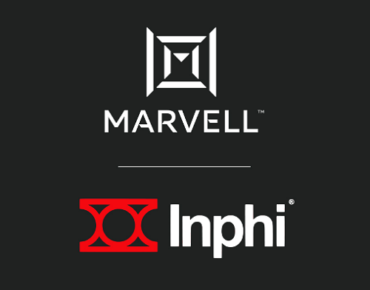Update: Marvell Acquiring Interconnect Chip Vendor Inphi in $10B Deal

Arm chip maker Marvell Technologies is buying data interconnect vendor Inphi for about $10 billion in cash and stock, continuing a wave of recent big-name vendor consolidations that have splashed across the IT landscape.
Marvell said the Inphi acquisition, which was unveiled Oct. 29, will help Marvell improve and extend its growth in cloud computing and 5G. The combined value of the companies will be about $40 billion after the transaction is completed.
The Marvell-Inphi deal continues a recent string of industry consolidations, including AMD’s announcement earlier this week that it is acquiring FPGA-maker Xilinx for $35 billion in an all-stock transaction, and Nvidia’s announcement in September that it is acquiring chip IP vendor Arm Ltd. for $40 billion from SoftBank.
“Both companies have already established themselves as key enablers of data infrastructure and we believe that this merger will accelerate our joint vision to lead the ongoing transformation in the fast-growing cloud and 5G markets,” Matt Murphy, president and CEO of Marvell, said during a conference call today with analysts. “Our two companies are strategically aligned, the product portfolios are very complementary, and most importantly we share very similar values founded on engineering excellence, innovation, and a passion for our customers' success.”
Bringing the two companies together to focus on their individual approaches to data infrastructure is the combined company’s best opportunity in semiconductors, said Murphy.
“Marvel's vision is to move, store, process and secure the world's data faster and more reliably than anyone else, and this acquisition significantly accelerates the move element in our vision,” said Murphy. “The combined company will be the premier enabler of high-speed data movement, which forms the connective fabric of our global data infrastructure and enables the data economy.”
The acquisition brings Marvell a multitude of benefits, said Murphy, including increased scale, roadmap acceleration, faster revenue growth and diversification, while maintaining its absolute focus on data infrastructure.
“I couldn't be more excited about this combination, and believe it will be as transformational for Marvell in the cloud market as Cavium was for us in the 5G market,” he said. “Combining Marvell's copper Ethernet franchise with Inphi's electro-optics portfolio will create an industry-leading high-speed data interconnect platform, serving the enterprise, carrier, data center and automotive end markets. Inphi will benefit from the company's larger scale, particularly in process technology, as we accelerate our 5nm and 3nm [chip] platforms.”
Details About Inphi’s Chip Products
Chris Koopmans, Marvell's executive vice president of marketing and business operations, told EnterpriseAI that Inphi builds the chips that go inside optical modules which send data, but doesn’t build the actual modules themselves.
“In the past, these modules had analog technology inside driving the optical signals – coming from companies like TI, ADI, Maxim,” said Koopmans. “But that technology ran out of steam below 100Gbps. Inphi saw this trend and invested in the digital technology [DSPs – digital signal processors] that would be needed to drive from 100Gbps to 800Gbps and beyond.”
Inphi’s products are a market leader at those speeds, which is why Inphi sales have been rising with cloud data center companies that are upgrading such capabilities, said Koopmans. “So, they are a chip maker – using the same advanced node technology like TSMC as Marvell.”
Ford Tamer, Inphi’s president and CEO, will join Marvell’s board of directors after the acquisition is completed.
The Inphi acquisition comes almost two months after Marvell announced its plans to turn its latest chip platform, the ThunderX3 line, into a custom-only chip business that can serve any customer and product need. Marvell said it sees custom chips as the wave of the future as customers clamor for custom-built processors to power a wide range of routers, switches, 5G hardware, IoT devices, appliances and other hardware. The Marvell ThunderX product line splashed onto the scene in late 2014, introduced by Cavium, which Marvell acquired in 2018.
Promising Acquisition for Marvell, Analysts Say
Charles King, principal analyst with Pund-IT, said Inphi's work and reputation with high-speed data semiconductor and interconnect technologies should help Marvell in a number of areas, including developing 5G and data center products.
“It joins other significant acquisitions, such as Cavium, that Marvell has made to boost demand and move into new markets,” said King. At the same time, this deal is different from the recent Nvidia-Arm and AMD-Xilinx deals, which cover significantly different technologies than Marvell and Inphi, he added.
Another analyst, Dan Olds, principal of Gabriel Consulting Group, said the Inphi deal extends Marvell’s reach and is a continuing example of chip consolidation in the industry.
“I think this is Marvell looking to increase their wallet share of the burgeoning 5G network market, adding fast interconnects to their stable of processors and ASICs,” said Olds. “I also see this as Marvell grabbing the best option out there before a more direct competitor purchases them. I don’t see this as Marvell looking to move into the data center, but more of them solidifying their grip on 5G edge technology.”
Rob Enderle, principal analyst with Enderle Group, said the deal could help put Marvell back on the map of critical companies to watch.
“It seems uniquely suited to a bundled solution that could be appealing to both cloud and on-premises vendors,” said Enderle. “Mergers aren’t easy, but if they pull this one off, it could place Marvell more closely in the heart of the vast cloud expansion driven by the COVID-19 pandemic.”













